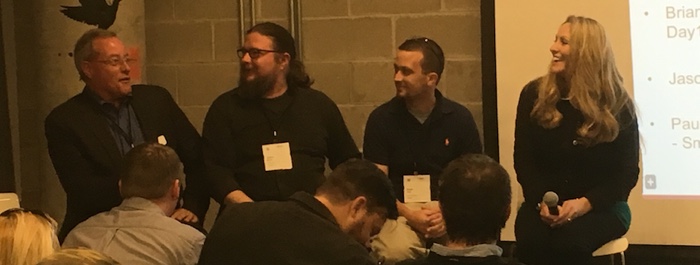As organizations look to move more workloads into the cloud, many have turned to Managed Service Providers (MSPs) to help with their journey. While organizations have the opportunity to choose from a vast pool of MSPs, not all MSPs are created equally when it comes to the cloud.
Case in point: This past week, Sumo Logic had the privilege of hosting a panel of three “next generation MSPs” – Day1 Solutions, Logicworks, and Smartronix. The panelists, along with Kelly Hartman, who heads up the MSP Program at AWS, met at the AWS Loft in SoHo to learn more about why these organizations are on the cutting edge of the cloud market transition and what that means for customers. From the discussion, I took away three key questions that I recommend IT leaders consider when determining which MSP is right for their journey to the cloud.
1. Is your MSP resting on its laurels?
A key characteristic of “next generation” organizations – whether an MSP, technology vendor, customer, etc. – is their passion for constant innovation, including their laser-like focus on the latest shifts and trends that influence innovation. Thus, next generation MSPs are built on speed and agility, and they quickly adapt to relevant trends – making investments in the right tools and technologies to meet the demands of their customers. All our panelists agreed that while these changes are necessary, they can be quite painful – from restaffing and training, to new tools and service offerings – but a true next generation MSP is able to see the value in these crucial investments. This shift will bring about both an expertise in industry trends and the specific “tools of the trade.”
Next generation MSPs will not only be well versed in new cloud-native tools, but will also recognize where their old tools simply won’t do the job. Jason McKay, Senior VP and CTO at Logicworks, advised that many customers aren’t fully aware of the breadth of capabilities that cloud-native tools can bring to the equation, and MSPs need to be able to educate customers on the new capabilities. This means going beyond just the new bells and whistles and delving deep into new ways of using data or monitoring applications.
2. Is your MSP a code company or a people company?
Our panelists also highlighted the operating model shift of next generation MSPs. In the past it was a common selling point for MSPs to showcase their fully-staffed NOC. Now, according to Brian Clark, VP of the Managed Service Division at Day1 Solutions, the degree of code running infrastructure operations is the new measure of IT confidence. It’s less about “old-world” system administrators, and more about “new-world,” agile infrastructure advisors, who can aid customers on the cloud/IT strategies relevant for their businesses while code takes over the rudimentary work of keeping the infrastructure up, running and viable for end customer engagement.
For example, MSPs that invest in cloud-native log management solutions will provide their customers with real-time, full-stack visibility of their entire infrastructure for managing, monitoring and troubleshooting their applications – a capability that simply didn’t exist in the past. This capability, known as continuous intelligence, enables customers to reallocate valuable IT headcount to focus on higher-value work, such as developing and delivering new business applications that can contribute to company profitability either through increasing revenue opportunities or internal process efficiencies.
3. Is your MSP willing to tell you your baby is ugly?
Early in the discussion Paul Beda, Principal Cloud Architect and Strategist at Smartronix, chimed in to say that a next generation MSP needs to be willing to tell customers their baby was ugly. What does this mean? When entering into a relationship with an MSP, you are seeking expertise, and this means finding an MSP who is willing to take charge, who will point out the flaws in your current systems, tell you what can be altered, and what needs to be re-architected entirely (aka, the ugly baby). Next generation MSPs do more than manage infrastructures, they have the expertise and experience to optimize, automate and innovate your IT environments to ensure it’s tightly aligned to business goals and objectives. Thus, you’ll maximize your MSP investment if you leverage your MSP as a strategic advisor in addition to a service provider.
The panel all agreed that the challenge here is that many customers try to come into the relationship and say how they want something, as opposed to what they really want. Even if your next generation MSP is telling you your baby is ugly, their expertise is lost if you aren’t willing to listen and let them do their jobs.
I believe these key questions will greatly aid your search for the right MSP partner. In addition, specific business and IT guidelines and requirements are essential, which is a point that Kelly Hartman emphasized, and AWS has recognized through its development of the Managed Service Provider Validation Checklist. AWS announced that the 3.0 version of this list will be available January 1.
Sumo Logic has been working closely with the AWS Managed Service Program to help enable next-generation MSPs by providing the continuous intelligence they need to deliver on the infrastructure needs of their customers. Learn more about our cooperation with this program in this blog post.


